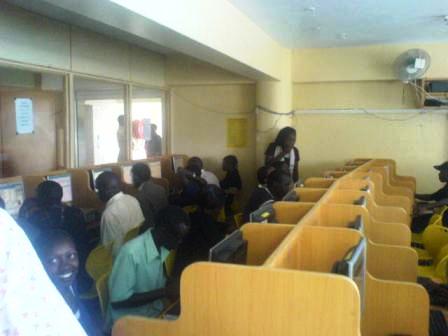THEME: MANY LIGHTS FOR HUMAN RIGHTS
Today we, together with many volunteers who host memorials worldwide for their communities commemorate the International AIDS candlelight Memorial (IACM). The IACM occurs on the 3rd Sunday of May. The memorial was started by people living with AIDS concurrently in San-Francisco and New York 1993 and it meant to honor all those who have been affected by the AIDS pandemic. As HIV/AIDS continue to impact communities around the world, the candlelight has become a way for communities to take action by publicly mourning their loved ones lost to AIDS and by strengthening local, national and international commitments to lighting the candle.
As MR. RED RIBBON KENYA, that is a symbol of solidarity of people living with AIDS, and as the coordinator of Badili Mawazo Self Help Group, I take this moment to share my sorrow, remember and honor my brothers, sisters and children who battled and lost the light against AIDS.
In Nakuru Kenya, this day was presided over by the Bishop of Nakuru Catholic Diocese, Bishop Maurice Muhatia of Holy-Cross Catholic Parish where volunteers and members of the neighboring community walked in with over 40 pieces of art with awareness messages, prevention management of HIV/AIDS stigma and discrimination.
THE CANDLELIGHT ADVOCACY PLATFORM
The candlelight memorial is committed to ending HIV/AIDS by raising awareness and advocating for the advancement of effective policies at all level
The program has identified the following key issues areas, as its platforms around which it cultivates community advocacy through its events and activities.
REDUCING STIGMA AND DISRIMINATION
Communities around the world affected by HIV/AIDS pandemic, particularly people living with the disease and other marginalized groups often face debilitating social stigma and discrimination simply because of their association with the virus, I, MR. RED RIBBON KENYA, and the candlelight memorial urge leaders to light discrimination through protecting the Rights of affected groups and individuals and fostering an inclusive human environment of both support and opportunity.
ENSURE ACCESS OF TREATMENT, PREVENTION AND CARE
Poor or marginalized communities have little access to basic HIV/AIDS services, I, MR. RED RIBBON KENYA, and the candlelight memorial urges leaders to ensure communities have equal access to treatment (such as testing and anti-retroviral therapy), evidence based prevention (such as education) and care and support (such as counseling and hospice). This requires meeting the needs of the orphans and vulnerable children (OVC), strengthening public health systems and vaccines development.
INCREASING RESOURCES FOR HIV/AIDS, MALARIA, TUBERCULOSIS AND OTHER RELATED ISSUES
The need for communities affected by HIV/AIDS, by far, outpace the current resources allocated to meet them, I, MR. RED RIBBON KENYA, and the candlelight memorial urges leaders to fulfill their commitment to adequately address the scope and depth of AIDS including other burdens accompanying or enhancing its spread (such as T.B, Malaria, sexually transmitted diseases and opportunistic infections) and other contributing social and economic challenges.
PROMOTING GIPA
Affected communities by HIV/AIDS are often neglected in the decision making processes that aim to assist them in the first place, I, MR. RED RIBBON KENYA, and the candlelight memorial urges leaders to incorporate the voices of the affected communities in formulation of policies as well as in the design and implementation of programs, their experiences and opinions are essential to the Global dialogue about the disease and this includes promoting the empowerment of women and youth. And as per the theme: MANY LIGHTS FOR HUMAN RIGHTS, dear world, I have faith that together we are the solution.
THANKS IN ADVANCE for your cooperation.
MR. RED RIBBON KENYA,
PETER ONYANGO OKOLA.



